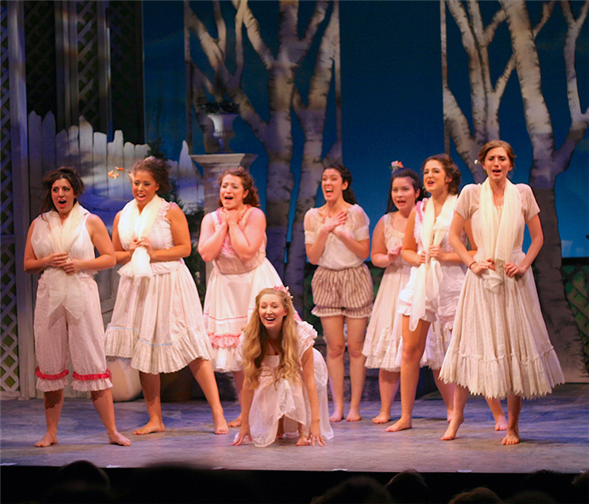Translate Page

How the cast of The Golden Bride learned to perform in Yiddish
---
Glenn Seven Allen was next in line to step into the audition room for the operetta The Golden Bride when he heard something inside that stopped him cold. "It freaked me out!" he says. "I never do this, but I called my agent and asked if he could buy me some extra time. He got me an extra day or two."
Allen had prepared to sing a tune in Yiddish but hadn't realized—until hearing the audition activity within—that the operetta's dialogue would also be in Yiddish. "It's easier to sing in another language because the music sets the cadence, as opposed to doing dialogue in a foreign language you've never spoken," he explains.
Grateful for the additional prep time, Allen buckled down. "I did as much work as I could, to not only get the pronunciation but also the translations so I could try to communicate like a human being," he says. "But I knew I could ultimately handle it because I also have an active career in opera, where I spend half my time communicating in other languages."
Eventually, he was offered the role. "Trust me, this goy was just as surprised as anybody when I got this offer," he says.
Of course, he's not alone in his lack of Yiddish expertise. None of the 20 cast members speak the language.
Jillian Gottlieb has also been reassured by her opera training, but she says she had a gut feeling she could manage the text. "I'm Jewish so I think it's in me," she laughs. "But I didn't anticipate how challenging it was really going to be."
Originally produced in 1923 at the Kessler's Second Avenue Theater, The Golden Bride was a smash hit during the heyday of New York's Yiddish Theatre District. With music by Joseph Rumshimsky, libretto by Frieda Freiman and lyrics by Louis Gilrod, the operetta enjoyed numerous revivals throughout the world through the 1940s, but it was lost following World War II. (Now through January 3, The National Yiddish Theatre Folksbiene will present the first contemporary revival of The Golden Bride at the Museum of Jewish Heritage. English and Russian supertitles are included.)
{Image1}
In the sweeping rags-to-riches romantic comedy, a young woman named Godele, who had been abandoned as a child, learns of an unexpected inheritance. She journeys from Russia to America to claim her estate and find her mother, as well as the man she will wed.
To make sure they capture the nuances of the story and the text, the cast has received intensive daily tutoring from both a Yiddish coach and a dialect coach. But Gottlieb soon realized that learning her own lines wasn't the only hurdle. "You also have to know what everyone else is saying so you can react properly," she says. "And I had to know my scene partners' lines so that I would know my cues. You have to know the script backwards and forwards. It's the most challenging thing I've done professionally."
And of course, Murphy's Law had to be considered. "We've all been talking about what happens when someone drops a line," she says. "I'm notorious for that. So I've decided that, if I drop a line, I'll walk to the front of the stage, look up at the supertitles to see where we are, and hopefully find my way back to Yiddish!"
Allen discovered that in order to fully realize his character, he needed to go beyond the initial language challenge and hone an accent. "The key was finding a style for the character of that era," he says. "My character, Jerome, is a wealthy American. So I didn't want to do a version of Brooklyn-ese Yiddish—not Borscht Belt-like. So I found the American accent by basing it on the early talkies—fast and sharp. Once we figured that out, everything felt a lot easier."
Gottlieb eventually found her own route into her character's skin. "The goal is to not be thinking of the phonetics," she says. "At rehearsal today, we were doing a scene that's very over the top—a melodrama within the show. And somehow it just came out. I can't explain it. It finally just clicked: the Yiddish was just coming out of my mouth without me thinking, and I finally became the character."
---
Jeff Potter is an arts journalist and musician living in Washington Heights.
Photos by Ben Moody. Top photo: Jillian Gottlieb (center) and the female company.
TDF MEMBERS: Browse all our discounted tickets for theatre, dance, and concerts.